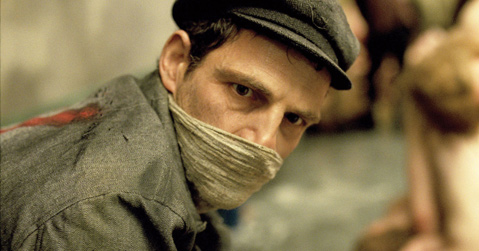Géza Röhrig Fathers the ‘Son of Saul’
Interview with the Actor from the Frontrunner for a Foreign Film Oscar

There’s much to be disturbed about while watching Son of Saul, the László Nemes film from Hungary that won the Grand Prize at Cannes and is considered a frontrunner for an Academy Award in the foreign film category.
The subject matter itself is gut-smacking: We follow a character named Saul Ausländer as he navigates his perilous place as part of the Sonderkommando, those short-lived units of Jews used by the Nazis during the Holocaust to do the dirty work of exterminating fellow Jews. Disturbing, too, is the cinematic style: extremely long takes with Saul’s face amazingly close to the lens as he hustles through rooms filled with bodies, screams, hatred, and escapism.
And then most disturbing, but on a promising front, is the work of lead actor Géza Röhrig, whose tremendously layered and gripping portrayal of Saul is uncanny given that he’s a kindergarten teacher, poet, and converted Hasidic Jew from Hungary who last acted 25 years ago. Röhrig took a break from an undisclosed location in Europe to briefly answer a few of my questions via email.
This is your first time acting in many years, so how were you chosen to be part of this film? It was destiny. When things have to happen, they happen. László and I have been friends for years, but I still don’t how I came to his mind for this part.
What were your thoughts when this script landed in your hands? I thought that there is no need for another Holocaust movie unless it does something that has never been done in the genre. By the time I finished reading the script, I realized that this film would do just that.
Do these Sonderkommando units feel like traitors to you or pure victims? The Nazi system was based on the following question: how the most Jews could be murdered with the least number of Germans being involved. So these monsters left the dirty work to the victims; they had to burn their own people. Apart from committing suicide, they had no way to refuse or resign. I find all attempts to shift the burden of guilt from the perpetrators to these forced deportees absolutely inexcusable.
I’ve read that you became a Hasidic Jew after visiting Auschwitz. How much does your faith direct your career? Faith is dialectic. No one believes all the time, and no one believes never. God is as much a necessity for me as oxygen; I simply can’t escape it. I feel like a small deer that the hunter has let run back to the woods. I am free, but I’m not free.
Were the long takes challenging? The golden rule in real estate is location, location, location. The golden rule for long takes is preparation, preparation, preparation.
This film has been incredibly well received by the critics. How have audiences in Hungary and other parts of Europe responded? The Holocaust holds a different place in the consciousness of the countries. Obviously countries like Spain or Australia are less connected. The two countries to watch are Germany and Israel. But all in all, the movie is being received overwhelmingly positively, which makes us very happy, especially if young people are seeing it. As a father of four, I know how much time kids spend online rather than face-to-face. I think the way to lead young people back to history is to create real, immersive experiences in cinema rather than just narrating facts.
What projects are you working on next? I am auditioning for an exciting role now. What happens remains to be seen.
4•1•1
Géza Röhrig will be honored with SBIFF’s Virtuosos Award on Saturday, February 6, at the Arlington Theatre. See sbiff.org.



